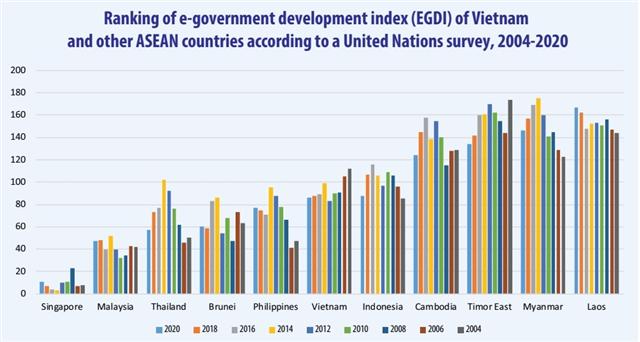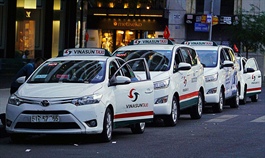Japanese expertise to accelerate e-government
Japanese expertise to accelerate e-government
Japan and Vietnam are fostering bigger cooperation in building up an efficient e-government in the Southeast Asian nation, with the former expected to share its experiences and know-how with the latter as it realises its national strategy on Industry 4.0.
|
The two nations last week held its first-ever online seminar on sharing experience and new policies of Japan to promote e-government, with the Japanese Ambassador to Vietnam Yamada Takio stating that Japan is looking to launch programmes in cooperation with Vietnam on the issue, with e-government becoming a common tool for the Japanese to conduct its macro-monitoring in favour of both businesses and individuals.
In Japan, a digital agency will be launched in September 2021 to reform inclusivity, remove most administrative management, and unify IT policymaking. In the opinion of Naohico Okuda, director of the Administrative Information System Planning Division under the Japanese Ministry of Internal Affairs and Communications’ Administrative Management Bureau, Japan’s new digital agency will look to consolidate procurement of government systems. The goal is to enable seamless sharing of information not only among different parts of the central government, but also with municipalities and administrative bodies.
The benefits would include improved analysis of big data, which can help determine the effectiveness of particular policies. Broader use of the system would let the government provide services more quickly, with cost savings. Measures will also be laid out to boost telemedicine and remote education, which are overseen by the health and education ministries, respectively.
Developing e-government and strong digital transformation in Vietnam will require the support of Japan, according to Mai Tien Dung, Minister and Chairman of the Government Office.
In the 2021-2025 period, Vietnam is expected to use cutting-edge technologies to further e-government aims in this country. For example, reforming infrastructure, applying cloud computing, upgrading cybersecurity, and building a digital ecosystem will be carried out based on AI and big data.
“We are looking forward to receiving more support from the Japanese government and businesses to accelerate digital transformation in the government,” Dung said. “In 2021 and beyond, e-government is a global trend and a promising area for economic development and the foundation for the international integration of Vietnam.”
“The e-government will attach IT applications with administrative reform to improve transparency, and change the way of serving and considering people and businesses at the centre,” he added.
In talks with Japanese Prime Minister Suga
Yoshihide in his first overseas visit to Vietnam last October, Vietnamese counterpart Nguyen Xuan Phuc proposed to boost cooperation in a variety of areas, including e-government.
A year ago, the two countries signed and exchanged ¥500 million ($4.9 million) in non-refundable aid, which was expensed for IT equipment and building a national reporting database in Vietnam.
“Through aid and cooperation programmes, the Japanese government would like to support and contribute to the reform process of Vietnam in the time to come,” said Ambassador Takio.
In fact, developing an e-government has already saved massive amounts of money for Vietnam. The National E-document Exchange Platform, launched in March 2019, has connected all ministries, agencies, and localities, transferred 3.8 million of documents, and served over 21,400 departments at all levels – and is saving VND1.2 trillion ($52.2 million) every year.
Meanwhile, Vietnam’s e-cabinet has run for 26 governmental regular meetings, taken 624 votes, replaced 238,000 documents, and saved VND169 billion ($7.35 million) per year. A National Reporting System is saving VND460 billion ($20 million), and the National Public Service Portal, which has supported over 2,700 services and handled 763,000 online documents, saves more than VND8 trillion ($347.8 million) per year. All the money is saved thanks to reductions in physical contact, travelling, and paperwork.
Over recent years, the performance of Vietnam’s e-government has been improving significantly, moving to 86th out of 193 countries and territories, 13 steps better than in 2014, according to the United Nations. The business environment ranking has improved 20 places to 70th out of 190, and ranks fifth in terms of ASEAN member states.


























